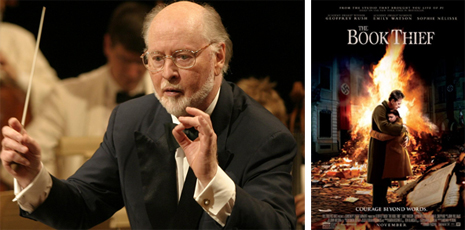|

John Williams fans were in for an unexpected treat late last year—in early August it was revealed that the composer would be scoring his first non-Spielberg film in eight years: The Book Thief. Presumably, Williams agreed to score the picture due to his love for the critically acclaimed book of the same title. The resulting score is a beautiful, delicate work, even if it draws heavily on previous pieces by the composer. Thematically, the score focuses on the ability of art to transcend death.
[Warning: Spoilers follow!]
The film, set in Nazi Germany, tells the story of Liesel, a young Russian girl adopted into the Hubermann family, who live on Himmel (Heaven) Street. Narrated by Death, the film charts the sacrifices civilians are forced to make in a period of total war. For the Hubermanns this task is complicated when they agree to hide an escaped Jew named Max from the Nazis. The film gets its title from Liesel—initially illiterate—who learns to read and write in a society that burns off-message books. She starts stealing books from the library of a wealthy Nazi. At the end of the film, Allied forces accidentally bomb Himmel Street, killing almost everybody Liesel has come to love. Max survives, having left midway through the film; the film ends with Death narrating that Liesel became a writer, and both she and Max lived into their old age.
Williams’ score gets an incredible amount of mileage from the use of the minor scale, as virtually every theme and motif incorporates it. First and foremost is the idea that opens the album and the film: a motif for untimely death (not to be confused with the character in the film, Death). The idea is basically just the ascending first five notes of a minor scale, absent the fourth scale degree. The use of such a common musical line creates a sense of inevitability, as the ear almost knows where the motif is headed, just as Death knows “one small fact: you are going to die.” But because Williams skips the fourth scale degree and switches from eighth notes to 16th notes after the first pitch, we also feel that the arrival at that inevitable destination is a bit rushed; hence it is a motif for untimely death.
The figure pops up throughout the score; when Liesel first enters the Hubermann household we hear it played backwards. The same retrograde variation occurs again when she steals a book from the remains of a Nazi-sanctioned book burning. It shows up yet again when Liesel is granted access to the library of a powerful Nazi. This reversal suggests that the scenes it accompanies challenge untimely death—in the first instance, the power of the family can prevent untimely death (as in both Max’s and Liesel’s case), and in the second two, the power of books can transcend death by giving voice to an author who is biologically expired. Finally, the first three notes of this motif are heard—again, played backwards—in the “Finale,” as Death reminisces over Liesel’s life as a successful author. Because only the first three notes of the motif are used in this instance, the absent fourth scale degree no longer gives us a sense of a truncated journey (if one starts on the third scale degree and goes down, the fourth is not an expected part of that journey); in this way Williams acknowledges that Liesel’s death was not untimely, while maintaining the ability of books to counteract the end of one’s physical existence (as the motif is still played backwards). This is the ultimate indication of books’ powers to overcome death—if Liesel’s ideas can live on after she has passed, is she really dead?
From this ascending motif, Williams derives a more direct idea for reading and writing, one that describes the “magnetism” Liesel feels pulling her towards the books. This idea is essentially a fluidly ascending and descending minor scale—an indication of reading and writing’s effortless ability to transcend the physical conception of life and death.
The character Death also receives a more identifiable theme (or as Williams calls it, the theme for “Providence”), often played in conjuction with the untimely death motif, which becomes an accompaniment. Death’s melody is slightly reminiscent of a theme from Williams’ Seven Years in Tibet, but it seems to be more directly influenced by the “Tuba Mirum” from Mozart’s Requiem Mass. This is a fitting reference, as requiem masses are obviously closely associated with Death. As discussed earlier, in the motif for untimely death, the fifth scale degree represents the final destination on the journey of life: death. Death’s theme starts on this fifth scale degree—for instance, when the two are played together in the opening of “One Small Fact,” the untimely death motif ends on a concert G, the same note that Death’s theme begins on. Death is the agent that brings about the result of an untimely passing. To make the derivation perfectly clear, the theme then descends down a minor scale.

Certain elements of Death’s theme are hidden in key moments of the score. For instance, the most emotionally intense cue in the score, “Rudy Is Taken,” is heard as Liesel reacts to the death of her family and friends. The sequence is filled with sudden key modulations, indicating Liesel’s emotional instability as wave after wave of realization hit her and she painfully starts to understand that virtually everybody she cares for is dead. The sequence is almost entirely based on an ascending line from Death’s theme; for the most straightforward variation, compare the ascending line at 1:21 of “Rudy Is Taken” to the one at 0:49 of “The Book Thief.”
|










